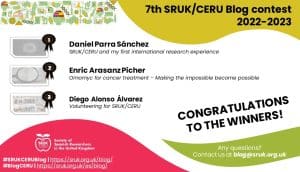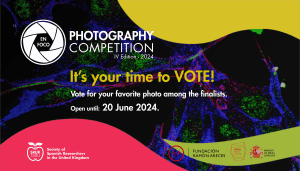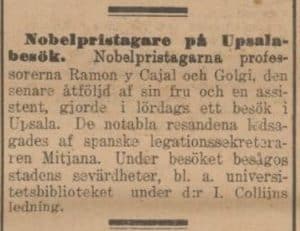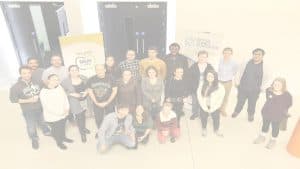This year marks the 50th anniversary of the 1969 Stonewall riots, which grew into the first Pride march [1]. Although there have been huge improvements in the rights of LGBTQ+ people since, they are still actively targeted by the authorities in 70 UN member states [2]. The situation seen in academia, as described here, is not but a reflection of the wider society.
While a more diverse and inclusive scientific environment leads to a richer exchange of ideas, we repeatedly see that women, ethnic and sexual minorities are particularly underrepresented at the top of the academic hierarchy. This lack of representation sends a disheartening message to new generations of scientists, who may perceive the academic environment as unwelcoming. An inclusive culture where researchers can be out without fear and do not need to continuously fight for equal opportunities is extremely important. A more welcoming academic environment will have knock-on effects in the wellbeing of future generations of researchers, as well as beyond academia.
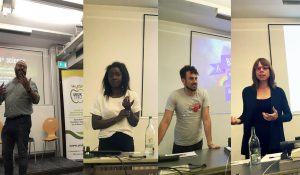
Speakers at SRUK’s 1st LGBTQ+ in STEM Day
During an event organized by SRUK covering the topic, cancer researcher Dr A. B. from Imperial College London highlighted the importance of intersectionality. She knows well what it means to belong to underrepresented groups, as a black lesbian and an immigrant herself. Her story helped the audience to understand the isolation caused by the lack of role models and the additional challenges minorities have to overcome to succeed in academia. “I felt I had to put myself out there as a role model to show younger generations that one can have a successful life no matter how many minority boxes you tick”, A.B. said.
Data from the American Physical Society [3] revealed that a high proportion of LGBTQ+ researchers have experienced (22%) or observed (39%) exclusionary behaviour due to gender expression/identity or sexual orientation at their academic workplace. This means that, as of today, researchers are still being bullied and harassed in academic departments on the grounds of their sexuality or gender expression. A survey that has been just been published in the UK by the Royal Society of Chemistry, the Institute of Physics and the Royal Astronomy Society [4] mirrors the results obtained in the US and reinforces the notion that LGBT+ scientists (especially lesbians, bisexuals and transgender/non-binary researchers) face discrimination in the academic environment, and they are also much more likely to consider leaving their workplace than their heterosexual peers (28% vs 16%).
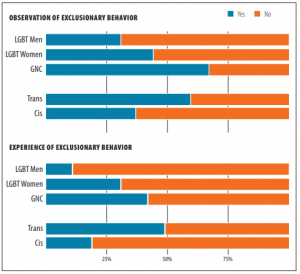
Adapted from [3]. Observation and experience of exclusionary behaviour split by gender and by trans/cis gender identity. Cis-gender respondents include all those who did not identify as trans
Discrimination, however, may begin earlier on. In a recent study, sexual-minority young people (i.e., individuals aged 10 to 21 identifying as not heterosexual) were more likely to suffer depression and up to four times more likely to have reported self-harm (including suicide attempts) compared to those who identified as heterosexual [5]. The situation is similar in Spain, where ‘maricón’ (‘faggot’) is amongst the most common insults in schools [6].
The fight for equality is particularly pressing for the transgender community, as a staggering 50% of the transgender and gender non-conforming people surveyed by the American Physical Society [3] have experienced harassment at their workplace. Furthermore, trans people are effectively excluded from the job market altogether as seen in Spain, where the unemployment rate for the transgender community is 86%, i.e. five-fold the overall unemployment rate in the country. Dr Marta Roman, a researcher at Hospital del Mar in Barcelona and a transgender rights activist, acknowledged wide support from her supervisors and peers, but knew that many others lack such support. Although the World Health Organisation recently removed “gender incongruence” as a mental disorder from their International Classification of Diseases, legal changes are still painfully slow-coming and trans people have even more fundamental fights ahead of them – including bureaucratic hurdles to change their name and legal gender or to have access to hormone therapy and undergo surgery should they wish to.
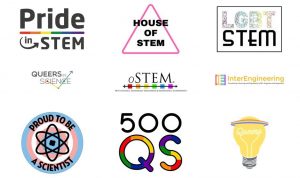
Organisers of LGBTSTEM Day
Dr Alfredo Carpineti, founder and chair of the Pride in STEM network, advocates for more research on the issue here in the UK [4]. This will help British institutions understand the challenges their researchers face, so that they can roll out policies to ensure that members of the LGBTQ+ community are not discriminated against. Dr Carpineti described some of the worrying statistics mentioned above [3], indicating that sexual minorities are less likely to be retained in STEM [7] and less than 60% of LGBTQ+ researchers are out to colleagues [8]. “If you aren’t raging, you haven’t been paying attention”, as he put it. Pride in STEM is working to showcase the work of LGBTQ+ researchers, so that they can act as role models for younger scientists to look up to. At Pride in STEM events, speakers are asked to kick off their talks by sharing something personal about themselves, to encourage others not only to reveal their identity, but to demonstrate a more approachable side to scientists.
In Spain, until now, there have been no LGBTQ+ networks for researchers, such as Pride in STEM, and scientific societies do not hold any data about the experience of being LGBTQ+ in the workplace. Javier Armentia, Director of Pamplona’s Planetarium and a science communicator, explained that events like SRUK’s 1st LGBTQ+ in STEM Day or LGBTSTEM Day would be unthinkable in Spain in the current climate. However, he is part of PRISMA, a group that aims to bring this to an end, fight discrimination of LGTBQ+ people and increase their visibility in STEM. PRISMA, which is being presented at this summer’s LGTBQ+ Prides in Barcelona and Madrid, will also provide a peer-support network for members. Importantly, they hope to engage and build bridges with academic institutions and scientific societies in Spain, which in the past have shown little to no interest in the challenges that LGTBQ+ people face in academia. Acquiring similar data to that of the US and UK learned societies is key to effectively tackle these issues.
While much has improved since the 1969 Stonewall riots that shook Manhattan, there is still a long way to go regarding LGBTQ+ rights. Networks are being put in place to support and celebrate LGBTQ+ individuals in STEM across the board in the UK, Spain and elsewhere. Further initiatives (such as 500QueerScientists) are celebrating diversity and showcasing LGBTQ+ scientists to promote role models and ensure that no one feels alone. This is an important issue and all eyes are now on these institutions.
In this regard, SRUK supports the notion that it is urgent for Spanish learned societies and research institutions to follow the lead of their American [3] and British counterparts [4], and understand the level of discrimination faced by researchers due to their sexual orientation and gender identity or expression.
In our view, institutions and scientific societies should then engage with the relevant actors and lead the way towards a more welcoming academic environment where LGBTQ+ researchers feel safe, included and with a sense of belonging.
By Dr Lorenzo de la Rica, Former Director of SRUK’s London Constituency, Research Funding Manager at Cancer Research UK (but writing in a personal capacity) & Pablo Izquierdo, Wellcome PhD Student, Department of Neuroscience, University College London, Director of Science Policy at SRUK
More info:
[1] Stonewall Riots: https://en.wikipedia.org/wiki/Stonewall_riots
[2] Map on sexual orientation-related laws: https://ilga.org/maps-sexual-orientation-laws
[3] Survey from the American Physical Society on LGBTQ+ discrimination: https://www.aps.org/programs/lgbt/upload/LGBTClimateinPhysicsReport.pdf
[4] Exploring the workplace for LGBT+ Physical scientists:
– https://www.rsc.org/campaigning-outreach/campaigning/incldiv/lgbt-report/
[5] Study on sexual minority youth: https://www.thelancet.com/journals/lanchi/article/PIIS2352-4642(18)30343-2/fulltext
[6] Report from the Spanish LGBTQ+ Federation: http://www.felgtb.org/rs/1584/d112d6ad-54ec-438b-9358-4483f9e98868/91c/filename
[7] Hughes, B. Science Advances (2018): https://advances.sciencemag.org/content/4/3/eaao6373
[8] Yoder & Mattheis, Journal of Homosexuality (2016): https://www.tandfonline.com/doi/abs/10.1080/00918369.2015.1078632
Initiatives and additional resources:
o Pride in STEM (https://prideinstem.org/),
o PRISMA (https://prismaciencia.org/),
o 500QueerScientists (500queerscientists.com),
o LGBTSTEM Day – 5th July 2019 (https://prideinstem.org/lgbtstemday/),
o House of STEM (https://houseofstem.org/),
o InterEngineering (http://interengineeringlgbt.com/),
o Out in STEM (https://ostem.org/),
o LGBT in STEM (https://lgbtstem.wordpress.com/)
o Queer in STEM (https://www.queerstem.org/)

